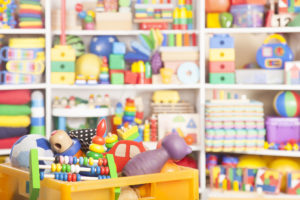Tampa Dangerous Children’s Toys Lawyer
When we purchase toys for our children, we have a reasonable expectation that they will be safe for them to enjoy. While many toys have age limits or special warnings placed on the packaging to alert parents to potential dangers, not all toys are known to be dangerous or defective until they are in the child’s hands.

If a defective toy injured your child, you probably have a lot of questions. Darrigo & Diaz is here to answer your questions and let you know if you have a case to seek compensation for your child’s injuries.
What are the Most Common Toy-Related Injuries?
According to CPSC, about half of toy-related injuries involve the head or face. This may include brain injuries, choking, and poisoning. Children under 3 are at a greater risk of choking than older children due to them having smaller airways and more frequently putting things in their mouths. Other common injuries include:
- Lacerations
- Fractures
- Eye injuries
- Burns
- Abrasions
- Puncture wounds
The most common toys to cause injuries are skateboards, riding toys, scooters, followed by balls, building sets, electronics, and toy vehicles. Pay special attention and know the risks when children are playing with these toys.
What is a Recall?
A product recall is when manufacturers retrieve defective products or products that are potentially unsafe from consumers. There is a public announcement of the recall and dangers of the product. Compensation is usually provided as part of the process as a full refund or replacement. Sometimes the item is banned, or the manufacturer may request that the consumer simply return the product for a replacement.
According to a report by the advocacy group Kids in Danger, recalls of toys and other children’s products have risen in 2020 with 58 products recalled compared to 52 in 2018. On average, there were a little more than 13 incidents that involved children getting injured before the products were recalled.
Recalls may be voluntary to avoid future problems, or they may be mandated. One regulatory body involved in recalls is the Consumer Protection Safety Commission (CPSC). To check for recalls of products in Florida, you can visit the Florida Department of Agriculture’s product recall listing site.
What Damages Can I Pursue in Florida for Defective Toys?
In Florida, product liability laws state that if you’re found to be partially liable for injuries (known as pure comparative negligence) caused by a defective product, the amount you can pursue is reduced by the percentage of your fault. For example, if the defective product caused $100,000 worth of damage, but you are found to be 50% at fault, the amount would be reduced by $50,000.
Florida also follows what is known as the economic loss doctrine, meaning you won’t be able to sue for product liability if your case relies solely on economic losses. Instead, you would pursue recovery for this type of damage under a contract lawsuit.
What Are the Different Kinds of Product Liability Claims?
There are three types of product liability claims related to toys: manufacturing defect, defective design, and failure to warn.
- A manufacturing defect is when something unintended occurred during the manufacturing process that caused the toy or its packaging to be unsafe.
- Defective design occurs when a toy fails to perform as safely as expected due to design flaws. This has nothing to do with manufacturing errors and means something inherently dangerous in the design.
- Manufacturers have a duty to warn about dangers associated with using the product as can be reasonably anticipated. This includes advertising choking hazards and age restrictions. When this does not happen, this is a failure to warn.
How Can I Prove a Product Liability Claim in Florida?
To prove a liability claim, you have to establish either negligence or strict liability. Negligence means that the manufacturer breached the duty of reasonable care that they owed you and that this was the cause of injury. In a strict liability case, instead of proving a breach of duty of reasonable care, you need to show that the product was sold in an unreasonably dangerous condition that existed when it left the manufacturer, causing injury to you or your child.
The court in Florida will perform what is known as the consumer expectations test. If the product fails to perform as well as a reasonable consumer would expect it to when used reasonably, then the court may deem it unreasonably dangerous.
Who is Responsible for Toy-Related Injuries in Florida?
Many parties are involved in producing and selling toys, from design to checkout. Therefore, when a toy-related injury occurs, there are many possibilities as to who is to blame. This includes both the toy and packaging designers, the manufacturer, the marketing agency, the distributor, and the retailer. The nature of the defect determines who is to blame. Finding out which product liability claim is applicable will assist in this process.
Many factors are considered when determining liability for dangerous children’s toy claims. The court will look at two theories: product liability and negligence. Examining the evidence for product liability will look at the product itself, while negligence will look at the entities’ actions within the supply chain.
Dangerous Toys Product Liability Attorney in Tampa
If you or your child have been injured due to a defective or dangerous product, don’t hesitate to get an experienced product liability attorney. Darrigo & Diaz have served the Tampa area since 1999 and we have the expertise you need to get the compensation you deserve. Contact us at (813) 774-3341 for a complimentary, no-obligation consultation right over the phone. You can also contact us online with any questions you have.

